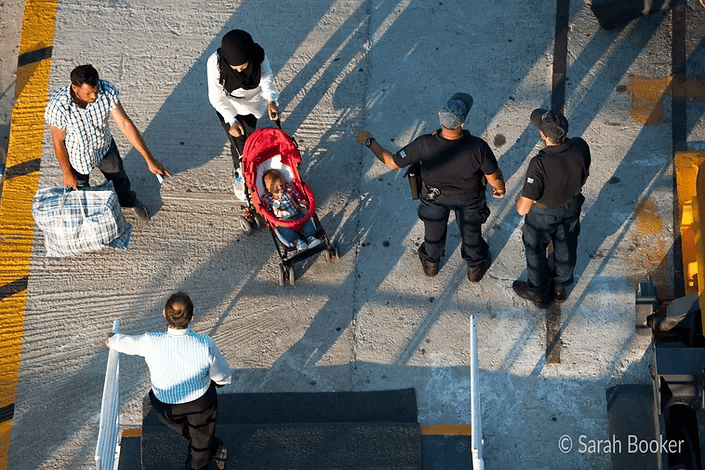Ελληνικα παρακάτω / Greek version below
Athens, 9th of November 2023: The undersigned organizations are sounding the alarm on the ongoing malfunctioning of the country’s reception system that deprives asylum seekers and refugees of access to rights and services, in violation of EU and national legislation.
On the islands, the reception facilities (CCACs) remain in a state of overcrowding, mostly in Kos, where the new arrivals are subject to an informal detention regime until their registration, without access to a doctor following the departure of the medical staff at the end of October. The situation is similar in Samos, where a military doctor has occasionally provided to meet the needs of almost 4,000 residents.
The situation is even more precarious at the sea entry points that are not equipped with a CCAC. At these entry points, despite the steady flow of arrivals, there is no provision from the competent authorities of the State to cover even the most basic reception conditions. As a result, access for new arrivals to fundamental rights such as housing, food and health care, an obligation and responsibility of the central administration, is left to the discretion of local authorities and civil society. The island of Rhodes, which completely lacks in infrastructure and reception services and where almost 5, 000 people have arrived since the beginning of the year, is an illustrative example of the above. Violations of the human rights of new arrivals are also recorded on the island of Lesvos, where people are reportedly detained for more than a month upon arrival. In some cases, they are even denied their access to health care and food while in detention.
In the mainland, the accommodation facilities have also overcome their full capacity, resulting in even extremely vulnerable asylum seekers (e.g. victims of torture, human trafficking, single-parent families, etc.) not having access to reception conditions. Concerning children, it is doubtful whether and to what extent child protection services are functioning. Asylum seekers with special medical needs, such as diabetics and cardiac patients, do not have access to adequate treatment and nutrition and/or are not identified in time, mothers cannot provide milk for their children, and families are looking for self-housing solutions.
We note that:
- The current situation of the reception system, impacting the possibility of accessing other rights, such as asylum, cannot be repeated every time the number of arrivals increases. The Greek State, with the assistance of the EU, must immediately ensure that the needs of all those seeking protection are met and that the long-term sustainability of the reception system is guaranteed, including through adequate staffing of the structures with the necessary personnel, in particular permanent medical and psychosocial staff.
- There is an urgent need to review the policy option to end alternative forms of reception, such as those that were provided under the ESTIA programme, which today could have made a decisive contribution both to the decongestion of the reception system and to the respect of the dignity of persons seeking international protection in Greece.
- The unilateralism in the management of the refugee-migration issue, which is almost exclusively linked in public political discourse to the prevention of arrivals, exposing the country internationally with the denounced practices of refoulement, constitutes a failure to manage a complex issue, which Greece and the EU must manage with full respect for International Human Rights Law and the constitutional principles of the European Union. To this end, especially in the context of the negotiations on the European Pact on Migration and Asylum, active and strong initiatives are needed to ensure a fair distribution of responsibilities among the EU Member States, which seem to continue to seek to shift responsibility to the states at Europe’s borders, but also to third countries, such as Libya, Turkiye, Tunisia, and now Albania following the signature of the bilateral agreement with Italy, which are characterized by at least a controversial record in terms of respect for the human rights of both refugees and their citizens.
The undersigned organizations:
- Arsis Association for the Social Support of Youth
- Avocats sans Frontières France
- Better Days Greece
- Changemakers Lab
- Defence for Children International Greece (DCI Greece)
- Diotima Centre for Gender Rights and Equality
- Dråpen i havet/ Stagona
- Equal Legal Aid
- Equal Rights Beyond Borders
- Fenix Humanitarian Legal Aid
- Greek Council for Refugees
- Greek Forum of Migrants
- Habibi.Works (Soup and Socks, e.V.)
- HIAS Greece
- I Have Rights
- Jesuit Refugee Service Greece (JRS)
- Legal Centre Lesvos
- Lesvos Solidarity
- Lighthouse Relief
- Mobile Info Team
- Project Armonia
- Refugee Legal Support (RLS)
- Samos Volunteers
- Symbiosis-Council of Europe School of Political Studies in Greece
- Thalassa of Solidarity
- Yoga and Sport with Refugees
Υποδοχή αιτούντων άσυλο στην Ελλάδα: το αίτημα για ανθρώπινες συνθήκες παραμένει
Οι υπογράφουσες οργανώσεις κρούουμε τον κώδωνα του κινδύνου για την συνεχιζόμενη δυσλειτουργία του συστήματος υποδοχής της χώρας, που αφήνει αιτούντες άσυλο και πρόσφυγες χωρίς πρόσβαση σε δικαιώματα και υπηρεσίες, κατά παράβαση της ενωσιακής και εθνικής νομοθεσίας.
Στα νησιά οι δομές υποδοχής (ΚΕΔΝ) παραμένουν σε κατάσταση συνωστισμού, με το πρόβλημα να καταγράφεται πιο έντονα στην Κω, όπου οι νεοαφιχθέντες/είσες υπάγονται σε ένα άτυπο καθεστώς κράτησης μέχρι να καταγραφούν, χωρίς πλέον να έχουν πρόσβαση ούτε σε γιατρό, μετά την αποχώρηση του ιατρονοσηλευτικού προσωπικού στα τέλη Οκτωβρίου. Παρόμοια είναι η κατάσταση και στη Σάμο, όπου παρέχεται περιστασιακά ένας στρατιωτικός γιατρός, για την κάλυψη των αναγκών σχεδόν 4.000 διαμενόντων.
Ακόμη πιο προβληματική παρουσιάζεται η κατάσταση στα θαλάσσια σημεία εισόδου που δε διαθέτουν ΚΕΔΝ. Στα εν λόγω σημεία, παρά τις σταθερές ροές αφίξεων, δεν παρέχονται ούτε καν στοιχειώδεις συνθήκες υποδοχής μερίμνη των αρμόδιων φορέων της Πολιτείας. Ως αποτέλεσμα, η πρόσβαση των νεοεισερχόμενων ατόμων ακόμη και σε βασικά δικαιώματα, όπως στέγαση, σίτιση και περίθαλψη, παρότι αποτελεί υποχρέωση και αρμοδιότητα της κεντρικής διοίκησης, μετακυλύεται και επαφίεται στη διακριτική ευχέρεια των φορέων της τοπικής αυτοδιοίκησης και της Κοινωνίας των Πολιτών. Ενδεικτικό παράδειγμα των ανωτέρω αποτελεί το νησί της Ρόδου, το οποίο στερείται παντελώς υποδομών και υπηρεσιών υποδοχής και στο οποίο από τις αρχές του έτους έχουν αφιχθεί σχεδόν 5.000 άτομα. Επίσης, παραβιάσεις των ανθρωπίνων δικαιωμάτων των νεοεισερχομένων καταγράφονται και στο νησί της Λέσβου, όπου οι άνθρωποι με την άφιξή τους υπόκεινται σε κράτηση, διάρκειας πάνω από έναν μήνα. Σε ορισμένες περιπτώσεις, μάλιστα, ενόσω τελούν υπό κράτηση, στερούνται της πρόσβασής τους σε ιατροφαρμακευτική περίθαλψη και σίτιση.
Στην ενδοχώρα οι θέσεις φιλοξενίας έχουν και εκεί εξαντληθεί, με αποτέλεσμα ακόμη και εξόχως ευάλωτες περιπτώσεις αιτούντων/ουσών άσυλο (π.χ. θύματα βασανιστηρίων, εμπορίας ανθρώπων, μονογονεϊκές οικογένειες κ.α.) να μην έχουν πρόσβαση σε συνθήκες υποδοχής. Όσον αφορά στα παιδιά, είναι αμφίβολο αν, ποιες και κατά πόσο λειτουργούν υπηρεσίες παιδικής προστασίας. Αιτούντες/ούσες άσυλο με αυξημένες ιατρικές ανάγκες, όπως διαβητικοί και καρδιοπαθείς, δεν έχουν πρόσβαση σε κατάλληλη θεραπεία και διατροφή ή/και δεν εντοπίζονται εγκαίρως, μητέρες δεν μπορούν να δώσουν γάλα στα παιδιά τους και οικογένειες ψάχνουν μόνες τους λύσεις για να αυτοστεγαστούν.
Επισημαίνουμε ότι:
- Η τρέχουσα κατάσταση του συστήματος υποδοχής, που έχει σαφή αντίκτυπο και στη δυνατότητα πρόσβασης σε άλλα δικαιώματα, όπως το άσυλο, δεν μπορεί να επαναλαμβάνεται κάθε φορά που αυξάνεται ο αριθμός αφίξεων. Η Πολιτεία, με τη συνδρομή και της ΕΕ, οφείλει να μεριμνήσει άμεσα για κάλυψη των αναγκών όλων όσοι αιτούνται προστασία, καθώς και για τη διασφάλιση της μακροπρόθεσμης βιωσιμότητας του συστήματος υποδοχής, μεταξύ άλλων, μέσω της επαρκούς στελέχωσης των δομών με το απαραίτητο, ιδίως μόνιμο ιατρικό προσωπικό και προσωπικό ψυχοκοινωνικών υπηρεσιών.
- Υπάρχει άμεση ανάγκη αναθεώρησης της πολιτικής επιλογής για τον τερματισμό των εναλλακτικών μορφών υποδοχής, όπως αυτές που παρέχονταν στο πλαίσιο του προγράμματος «ΕΣΤΙΑ», το οποίο θα μπορούσε σήμερα να είχε συντελέσει καθοριστικά, τόσο στην αποσυμφόρηση του συστήματος υποδοχής, όσο και του σεβασμού της αξιοπρέπειας των ατόμων που ζητούν διεθνή προστασία στην Ελλάδα.
- Η μονομέρεια στη διαχείριση του προσφυγικού-μεταναστευτικού, που συναρτάται σχεδόν αποκλειστικά στο δημόσιο πολιτικό λόγο με την αποτροπή αφίξεων, και που έχει εκθέσει τη χώρα διεθνώς με τις καταγγελλόμενες πρακτικές επαναπροωθήσεων, συνιστά αποφυγή διαχείρισης ενός σύνθετου ζητήματος, το οποίο η Ελλάδα και η ΕΕ οφείλουν να διαχειριστούν με πλήρη σεβασμό του Διεθνούς Δικαίου Ανθρωπίνων Δικαιωμάτων και των καταστατικών αρχών της Ευρωπαϊκής Ένωσης. Προς αυτόν τον σκοπό, ιδίως στο πλαίσιο των διαπραγματεύσεων για το Ευρωπαϊκό Σύμφωνο Μετανάστευσης και Ασύλου, χρειάζονται ενεργητικές και σθεναρές πρωτοβουλίες για τη διασφάλιση μιας δίκαιης κατανομής των ευθυνών ανά τα κράτη μέλη της ΕΕ, που φαίνεται να συνεχίζουν να επιδιώκουν τη μετάθεση των ευθυνών προς τα κράτη στα σύνορα της Ευρώπης, αλλά και προς τρίτες χώρες, όπως είναι η Λιβύη, η Τουρκία , η Τυνησία, και πλέον η Αλβανία μετά την υπογραφή της διμερούς συμφωνίας με την Ιταλία, που χαρακτηρίζονται από ένα τουλάχιστον αμφιλεγόμενο ιστορικό ως προς τον σεβασμό των ανθρωπίνων δικαιωμάτων, τόσο των προσφύγων, όσο και των πολιτών τους.
Οι υπογράφουσες οργανώσεις:
- Avocats sans Frontières France
- Better Days Greece
- Changemakers Lab
- Defence for Children International Greece (DCI Greece)
- Diotima Centre for Gender Rights and Equality [Διοτίμα – Κέντρο για τα Έμφυλα Δικαιώματα και την Ισότητα]
- Dråpen i havet/ Stagona
- Equal Legal Aid
- Equal Rights beyond Borders
- Fenix Humanitarian Legal Aid
- Habibi.Works (Soup and Socks, e.V.)
- HIAS Greece
- I Have Rights
- Jesuit Refugee Service Greece (JRS)
- Legal Centre Lesvos
- Lighthouse Relief
- Mobile Info Team
- Project Armonia
- Refugee Legal Support (RLS)
- Samos Volunteers
- Symbiosis-Council of Europe School of Political Studies in Greece
- Thalassa of Solidarity- Θάλασσα Αλληλεγγύης
- Yoga and Sport with Refugees
- Αλληλεγγύη Λέσβου ΑΜΚΕ
- Άρσις Κοινωνική Οργάνωση Υποστήριξης Νέων
- Ελληνικό Συμβούλιο για τους Πρόσφυγες- Greek Council for Refugees
- Ελληνικό Φόρουμ Μεταναστών- Greek Forum of Migrants



